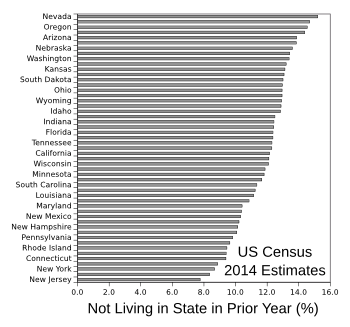Alvin Toffler
July 11, 2016
Yogi Berra is alleged to have said, "It's tough to make predictions, especially about the future." While this
proverb is undoubtedly true, If Berra did say this, it's not original with him. The origins of this proverb go back to early
20th century Denmark, so it has been attributed quite often to
physicist and
Nobel Prize Laureate,
Niels Bohr. This proverb appears to have been first used as a
pun in a session of the
Danish parliament in the late
1930s.[1]
This proverb illustrates the perils of being a "
futurist," the
modern version of a
Biblical prophet. The best known futurist,
Alvin Toffler, died last month at age 87.[2-6] Toffler, in his 1970 book, "
Future Shock,"[7] predicted the massive
social upheaval wrought by
technology in future
decades.
.jpg)
Alvin Toffler (Oct. 4, 1928 - June 30, 2016).
Toffler was born in New York City to parents who were Polish Jewish immigrants, and he grew up in Brooklyn.
(Photo by Vern Evans, via Wikimedia Commons.)
While
post-war economists in the
America were predicting shortened
work weeks and the problem of what we should do with all our
leisure time, Toffler was predicting a less optimal future. I wrote about the
evolution of
work in the 20th-century in a
recent article (The Future of Work, March 3, 2016).
Toffler was interested in
writing at an early age, and he received a
Bachelor of Arts degree in
English from
New York University, where he met his future
wife and
collaborator, Adelaide ("Heidi") Farrell.[2] Either out of necessity, or a desire for the same worldly experience that shaped
John Steinbeck and
Jack London, he first worked in
manufacturing, living in
Cleveland, a part of
industrial America.[2,4] Toffler did
welding and
machinery repair for about five years, and he was
injured when a
steel beam fell on him.[2]
Toffler used his work experience to start his
journalism career, first working in the manufacturing
trade press. He later wrote for
Fortune magazine, and he wrote
freelance magazine articles.[2] In the
1960s, he wrote about
labor issues as a
newspaper journalist while working on "Future Shock."[4] His work experience gave him insight into a world in which
factory workers were being replaced by machines.[4]
Future Shock, was a popular book, selling 15 million copies.[3] Its topic was the problem of the rapid changes happening in our
technological world, and it was written in a style that was far more accessible than
scholarly tomes on the same subject.[3-4] As Toffler wrote, our future's arriving too quickly was causing social and economic problems that led to
mental anguish for us all.[6] He wondered whether
humans were
psychologically capable of handling such rapid changes; instead, being "doomed to a massive
adaptational breakdown."[2]
The topics of Future Shock include the shift of manufacturing to
disposable items, such as
ballpoint pens and
paper towels, and the "
planned obsolescence" of devices, such as
computers, that have better replacements available long before their
end-of-life. More problematic is the decline of entire industrial sectors that force people to change
professions and place of
residence. Change of residence results in the social upheaval of losing contact with friends and family, the former leading to increased
social alienation and the later leading to the demise of the
nuclear family.[3]

Estimated change of state residence for 2014.
About 8% of the residents have moved into Tikalon's state of New Jersey from another state in the past year. This fraction, although large, is still smaller than Nevada's 15%.
(Graphed using Gnumeric from US Census Bureau Data. Click for larger image)
Future Shock was the first book in a
trilogy that included
The Third Wave(1980) and
Powershift (1990).[2] The Third Wave expressed the idea that rapid
communication would transform all aspects of modern life.[4] The Third Wave is also the title of a book by
AOL founder
Steve Case.[5] Along with the term, "future shock," these books contained such
neologisms as "
information overload,"[3] "
adhocracy,"[5] (first used by
Warren Bennis in 1968), and "de-massify."[4]
"Adhocracy" is the state of
civilization in which both
government and
businesses are forced to keep pace with their
citizen-
consumers shifting preferences.[5] "De-massification" is the shift from
mass production to
small enterprise, as we've seen in the "
dot-com" revolution.[4] Toffler saw the
European Union as contrary to de-massification, since it would lead to increased
bureaucracy and inflexibility.[4] Some of Toffler's predictions, such as
space colonization and people living
beneath the sea, did not happen.[3] However, he did predict the increased use of
renewable energy.[4]
As most
parents have noted, their
children are more adapted to the future than they are, so the shock of the future has been somewhat mitigated. I personally eschew
online financial transactions, and I still make trips to a
bank branch, but
younger people happily
photograph checks for
deposit. Alvin and Heidi Toffler predicted such a co-evolution of technology and society.[5]
As Toffler most
presciently said, "The
illiterate of the 21st century will not be those who cannot read and write, but those who cannot learn, unlearn and relearn."[3] In a 2010
interview with
NPR's Martin Kaste, he also said that "Anybody that tells you they know what's going to happen, don't believe a word they say!"[2] Toffler is survived by his wife and collaborator, Heidi, and a
sister, Caroline Sitter.[2-3,6] We, too, are survivors in this shocking future.

An example of technological change. In my childhood, all clocks were analog. Today's children have difficulty understanding the expression, clockwise, and their grandparents have difficulty stopping their clocks from flashing "12:00." (Created by the author using GIMP. Background image by Thomas Bresson, analog clock image by Luispihormiguero, and digital clock image, all from Wikimedia Commons.)
References:
- Quote Investigator, October 20, 2013.
- Chris Arnold, "Future Shock Author Alvin Toffler Dies at 87," NPR, June 30, 2016.
- Alvin Toffler, futurologist guru, dies at 87, BBC, June 30, 2016.
- Jill Leovy, "Alvin Toffler, author of 1970 bestseller 'Future Shock,' dies at 87," LA Times, June 29, 2016.
- Parag Khanna, "Man of the "Future Shock": Remembering Alvin Toffler," Quartz, June 29, 2016.
- Matt Novak, "Alvin Toffler, Legendary Author of Future Shock, Dies at 87," Gizmodo, June 29, 2016.
- Alvin Toffler, "Future Shock," Paperback, Reissue Edition, Bantam, June 1, 1984, 576 pp., ISBN-13: 978-0553277371 (via Amazon).
Permanent Link to this article
Linked Keywords: Yogi Berra; proverbial phrase; proverb; 20th century; Denmark; physicist; Nobel Prize in Physics; Nobel Prize Laureate; Niels Bohr; pun; Danish; parliament; 1930s; futurist; modern history; Bible; Biblical; prophecy; prophet; Alvin Toffler; Future Shock; society; social; technology; decade; Alvin Toffler (Oct. 4, 1928 - June 30, 2016); New York City; parent; Polish; Jewish; immigrant; Brooklyn; Wikimedia Commons; World War II; post-war; economist; United States; America; working time; work week; leisure time; evolution; wage labor; work; author; writing<; Bachelor of Arts degree; English literature; ew York University; spouse; wife; collaboration; collaborator; John Steinbeck; Jack London; manufacturing; Cleveland; industry; industrial; welding; machine; machinery; repair; injury; injure; steel; I-beam; journalism; trade magazine; trade press; Fortune magazine; freelance; magazine; 1960s; employment; labor; newspaper; factory; technology; technological; scholarly method; tome; mental disorder; mental anguish; human; psychology; psychological; adaptation; adaptational; disposable item; ballpoint pen; paper towel; planned obsolescence; computer; product end-of-life; profession; residence; social alienation; nuclear family; US Census Bureau; U.S. state; Tikalon; New Jersey; Nevada; Gnumeric; trilogy; The Third Wave; Powershift; communication; AOL; Steve Case; neologism; information overload; adhocracy; Warren Bennis; civilization; government; business; citizen; consumer; mass production; small business; small enterprise; dot-com company; European Union; bureaucracy; space colonization; seabed; beneath the sea; renewable energy; parent; child; children; Internet; online; finance; financial; bank branch; youth; younger people; digital photography; photograph; check; deposit; prescient; literacy; illiterate; interview; NPR; Martin Kaste; sibling; sister; technology; technological; childhood; clock; analog; clockwise; grandparent; GIMP; Thomas Bresson.